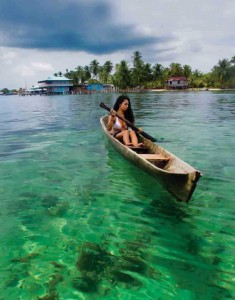 “I hear Bocas Del Toro is changing,” a friend warned as I prepared a return visit to the idyllic Panamanian archipelago that served as my home several years ago. The face of Bocas has been evolving ever since the arrival of Columbus in 1502, adapting bit by bit to the barrage of new cultures trying to lay claim to their piece of paradise. But, I wondered, just how much of its quaint reggae ambiance and idiosyncratic character had succumbed to development and burgeoning tourism since I’d last visited?
“I hear Bocas Del Toro is changing,” a friend warned as I prepared a return visit to the idyllic Panamanian archipelago that served as my home several years ago. The face of Bocas has been evolving ever since the arrival of Columbus in 1502, adapting bit by bit to the barrage of new cultures trying to lay claim to their piece of paradise. But, I wondered, just how much of its quaint reggae ambiance and idiosyncratic character had succumbed to development and burgeoning tourism since I’d last visited?
As our plane descended from an azure sky, almost everything appeared exactly as I remembered: simple motorized dinghies and traditional hand-paddled “cayucos” scurrying between six inhabited islands; rickety docks abutting the sea; wooden shacks and thatched-roof huts fringing the shores; desolate emerald atolls sprinkled like fairy dust atop the jeweled Caribbean; water so warm and translucent it mirrors your soul; and the oldest marine park in the country silently safeguarding endangered manatees and sea turtles. The biodiversity here is so vital that a Smithsonian Tropical Research Center set its anchor on the main island to study and protect it.
Touted as “the Galapagos of the 21st Century,” spectacular coral reefs and marine life paint a kaleidoscopic sea trimmed in white sand beaches, while a remarkable array of fauna inhabit the mangrove-entwined islands. The area has long attracted scientists, intrepid travelers and a recent spate of international “Survivor” knockoffs controversially staging mock reality shows.
However, the area’s distinctive ethnic tapestry – an intricate weaving of indigenous, Afro-Caribbean, Latin and foreign-infused traditions – is what truly defines its persona and bespeaks a storied past. After Columbus’ discovery came the influx of renegade British pirates and European speculators (with West Indian slaves in tow), followed by Jamaican immigrants tracking the vibrant cacao and banana trade in the 1800s. At the turn of the century the United Fruit Company arrived and erected Bocas Town, the only Panamanian city constructed entirely of wood.
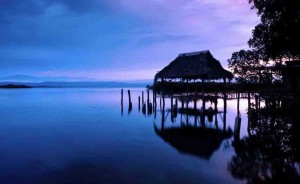 As I ambled past Bocas’ rustic and festively-hued buildings – some dating back to its inception – a smattering of Kuna and dreadlocked street vendors were stationed in front of low rise restaurants, souvenir shops and Chinese-owned markets hawking pig tails alongside Chips Ahoy cookies. Yes, now I began noticing some differences – a few more stores and hotels, an Internet cafe and several restaurants. But the authenticity and Wild West charm persisted amid – and despite – the amenities. Growing pains were only vaguely apparent in the dissonance of a crumbling shack sitting beside a shiny new yoga studio, and the pristine apartment complex shadowing my former flea-bitten abode.
As I ambled past Bocas’ rustic and festively-hued buildings – some dating back to its inception – a smattering of Kuna and dreadlocked street vendors were stationed in front of low rise restaurants, souvenir shops and Chinese-owned markets hawking pig tails alongside Chips Ahoy cookies. Yes, now I began noticing some differences – a few more stores and hotels, an Internet cafe and several restaurants. But the authenticity and Wild West charm persisted amid – and despite – the amenities. Growing pains were only vaguely apparent in the dissonance of a crumbling shack sitting beside a shiny new yoga studio, and the pristine apartment complex shadowing my former flea-bitten abode.
Because the archipelago’s stock in trade these days is tourism and real estate, a debate surrounds the inevitable trend toward amplified development and its impact on the local environment, economy and way of life. How is tourism affecting the Ngöbe-Buglé Indians, for instance, many of whom still depend on agriculture and fishing for sustenance? Do they benefit from the increase in foreign visitors?
Some indigenous communities like Salt Creek, Bahia Honda, and Sandubidi are attempting to capitalize on the boon by creating small tourism cooperatives. A Ngöbe enclave sandwiched between foreign-owned land on San Cristobal welcomed their first tour group three years ago. Under the guidance of Peace Corp volunteer Piper Frode, they now offer half-day sightseeing excursions, local craft workshops and a rudimentary hostel for overnight stays. The problem is that most tour operators don’t promote jaunts to tribal villages (with the exception of Bocas Allied Sustainable Tourism Alliance, www.discoverbocasdeltoro.com and Jampan, www.jampanresort.com).
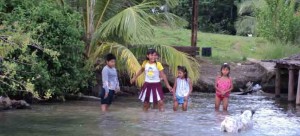 “You create hope for these people that tourism will improve their lot in life and when there is no follow through they feel deceived,” said Tito Thomas, owner of Hotel Bahia Grande on Isla Colon. He acknowledged that development can’t – and perhaps shouldn’t – be contained as it is essential for improved infrastructure, but that it should prevail with an eye toward environmental responsibility and conservation of cultural traditions.
“You create hope for these people that tourism will improve their lot in life and when there is no follow through they feel deceived,” said Tito Thomas, owner of Hotel Bahia Grande on Isla Colon. He acknowledged that development can’t – and perhaps shouldn’t – be contained as it is essential for improved infrastructure, but that it should prevail with an eye toward environmental responsibility and conservation of cultural traditions.
But still, on islands like Solarte, just minutes from the town of Bocas, the indigenous continue to exist without electricity. A small resort on the same islet offers its customers all modern amenities, including power. It is reported that the American owner intends to assist his neighbors in obtaining such services. Several charitable organizations have stepped up to address issues affecting the Ngöbe, including Dead Wheat International, which has engineered programs in an effort to empower indigenous women towards more self-sufficiency in commercial pursuits. The government provides the tribe with some economic incentive for improvement, like contributing $80.00 quarterly for each student who “studies well.” However, inflated prices in town and the increasing necessity to speak English has prevented many individuals from fully benefiting from the area’s growth, even forcing some to relocate to the mainland where the cost of living is substantially lower.
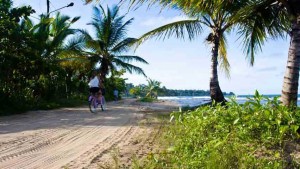 “The Indians speak both Spanish and our native language, but there is now pressure to know English to get the better jobs,” local teacher Ilke Munoz said. She believes that tourism and foreign investments can provide opportunity, but can also lead to abuse and corruption. To wit, there is the controversy surrounding Bastimentos and other islands where developers have scooped up parcels of land envisioning luxury resorts and lavish condos. Species endemic to the region like the red frog are already disappearing. Vocal residents who successfully fought a proposed golf course continue to rally for maintenance of the archipelago’s fragile eco-system and unique spirit.
“The Indians speak both Spanish and our native language, but there is now pressure to know English to get the better jobs,” local teacher Ilke Munoz said. She believes that tourism and foreign investments can provide opportunity, but can also lead to abuse and corruption. To wit, there is the controversy surrounding Bastimentos and other islands where developers have scooped up parcels of land envisioning luxury resorts and lavish condos. Species endemic to the region like the red frog are already disappearing. Vocal residents who successfully fought a proposed golf course continue to rally for maintenance of the archipelago’s fragile eco-system and unique spirit.
“The recent real estate crash is the best thing to happen here,” opined Mathilde Grand, a chocolate co-op founder, who blames the invasion of speculators for upsetting the area’s delicate balance. “By curtailing over-development, we lose some money but will recuperate our quality of life,” she said, adding that the part time status of most foreign property owners doesn’t contribute much to the local economy anyway. In fact, according to Thomas, those most vehemently opposed to untamed development are the expats who relocated to Bocas in search of a gentle and stress-free lifestyle; foreigners that understand and appreciate their surroundings are battling other foreigners that want to exploit it.
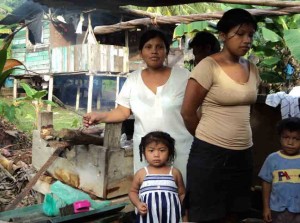 For all the inevitable issues that plague any evolving tourist site, Bocas Del Toro remains among the most pristine, culturally authentic, and tranquil destinations on earth. Where accommodations range from basic to luxurious, where the notorious parties at Barco Hundido disco – famed for its visible sunken ship beneath the dance floor – rage all night, where surf breaks are grand and where a psychedelic underworld waits just below the surface.
For all the inevitable issues that plague any evolving tourist site, Bocas Del Toro remains among the most pristine, culturally authentic, and tranquil destinations on earth. Where accommodations range from basic to luxurious, where the notorious parties at Barco Hundido disco – famed for its visible sunken ship beneath the dance floor – rage all night, where surf breaks are grand and where a psychedelic underworld waits just below the surface.
HELPING HANDS
Numerous charitable organizations work to make the area of Bocas del Toro a better place for residents and visitors, but these two stand out from the crowd.
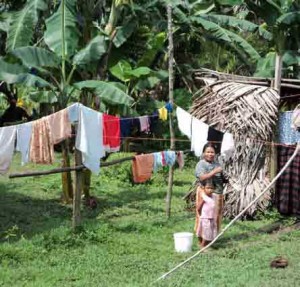 DEAD WHEAT INTERNATIONAL www.deadwheat.com
DEAD WHEAT INTERNATIONAL www.deadwheat.com
Founded in Panama in 2007 by Steve Bliss and several expatriate families, Dead Wheat International tackles sustainability concerns in third world communities using technology and humanitarian alliances. Dead Wheat empowers underprivileged communities toward greater selfsufficiency by providing people with fresh air, clean water and sufficient food. Their relationship with the Ngöbe-Buglé tribe enables them to address specific vulnerabilities plaguing Panama’s indigenous groups. One current project involves the manufacture and distribution of smokeless stove molds to mitigate health and environmental problems caused by open-fire cooking in enclosed spaces.
To donate or volunteer, contact: Ken Newton knewton@deadwheat.com
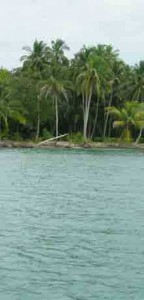
CITIZEN OF CHOCOLATE
French expat and longtime Bocas resident Mathilde Grand is the brainchild behind Citizen Of Chocolate, a collective enterprise intended to empower Ngöbe women toward economic self-reliance through the harvesting, production and sale of organic Tribal Chocolate. Grown in the jungles of Bocas Del Toro, cacao is not only the primary ingredient in a typical indigenous drink, but it is also perfect for baking. Ngöbe women are often ill equipped to market and capitalize on this local resource. Grand works in partnership with the Ngöbe, serving as Tribal Chocolate’s sole distributor. The product is available in Panama, the United States, England and France with plans for expansion.
Order Ngöbe-Buglé harvested chocolate by contacting: wanaragua@ yahoo.com
Originally published in Landings, Nature Air’s in-flight magazine. DOWNLOAD




 Global Gypsy Collection ©2010 - 2011
Global Gypsy Collection ©2010 - 2011